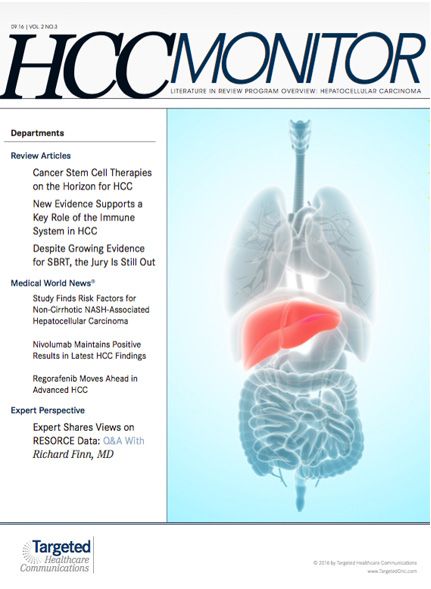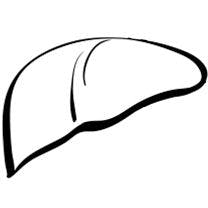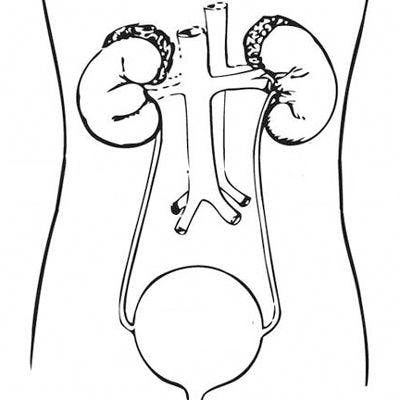Nivolumab Maintains Positive Results in Latest HCC Findings
Nivolumab (Opdivo) continues to post “highly encouraging’” and durable responses in patients with advanced hepatocellular carcinoma (HCC) regardless of whether they had hepatitis B or C or whether they had received prior treatment with sorafenib (Nexavar), according to the lead investigator on the early-phase study.
The objective response rate (ORR) was 16% among 214 patients who participated in an expansion cohort of the CheckMate-040 study, Bruno Sangro, MD, PhD, reported at the at the 2016 International Liver Cancer Association conference.1Among the 35 patients who responded, 33 had partial responses and 2 experienced a complete response. Another 111 patients had stable disease.
The interim findings are similar to efficacy and safety observations from the dose-escalation portion of the study reported at the 2016 ASCO Annual Meeting,2although the follow-up period is much shorter than the 3-year timeframe in the first phase, said Sangro, who is director of the Liver Unit at Clinica Universidad de Navarra in Pamplona, Spain.
Sangro said the follow-up period is too short to draw conclusions about overall survival (OS). The OS rate for all patients was 82.5% at 6 months and 70.8% at 9 months.
“The 6-month and 9-month survival rates are not only highly encouraging but fit very well with the findings in the escalation cohort, in which the follow-up is much longer and in which 14.2-[month] median overall survival was reported at ASCO this year,” sand Sangro. “While these results are preliminary, the 9-month overall survival rate of 71% is certainly encouraging.”
In all, the expansion phase of the trial consisted of 4 groups of patients, all of whom received nivolumab at 3 mg/kg every 2 weeks: patients without hepatitis who had not received or were intolerant to sorafenib (n = 54); participants who had progressed after receiving sorafenib (n = 58); patients who were infected with hepatitis C (n = 51); and individuals who were infected with hepatitis B (n = 51).
In the 2 hepatitis cohorts, participants must have received prior sorafenib, become intolerant to it, or progressed during or after therapy with the agent. Many of the participants across all cohorts were heavily pretreated with therapies including surgical resection (58%), locoregional therapy (59%), and systemic therapy including sorafenib (73%).
The primary endpoint of the trial was ORR according to RECIST v1.1 criteria by blinded independent central review. Secondary endpoints included duration of response, time to response, time to progression, and OS.
During the study, patients received a median of 10 doses of nivolumab (range, 1-27) over a median time on treatment of 20 weeks, Sangro said. “Most of the patients who discontinued treatment did so because of progression,” he said. “Only a minority of 7% of the total population had to discontinue treatment because of study drug toxicity. Treatment was, by and large, very well tolerated.”
The most frequent symptomatic treatment-related adverse events (AEs) of any grades included fatigue (21%), pruritus (15%), and rash (12%). Treatment-related grade 3/4 AEs were reported in 39 patients (18%).
In analyzing response rates by cohort, Sangro said ORRs were similar across the groups. The ORR ranged from 12% for patients who had been infected with hepatitis B to 20% for uninfected patients who were sorafenib naïve or intolerant. “Etiology is not a major factor in defining the response to nivolumab therapy,” Sangro said.
He also said that the response rate did not differ by PD-L1 expression status, as assessed by immunohistochemistry on ≥1% versus <1% of tumor cells.
In terms of durability, Sangro indicated that responses were ongoing in 30 of 35 responders at the time of analysis in March, and the median duration of response had not yet been reached. He also said 29 of the patients responded within 3 months of beginning treatment.
As analysis continues on this group of patients, a phase III randomized trial of nivolumab versus sorafenib has been launched in the frontline setting. The trial, which is seeking to enroll 726 patients, has an estimated primary completion date of July 2017.
References:
- Sangro B, Melero I, Yau T, et al. Safety and antitumor activity of nivolumab in patients with advanced hepatocellular carcinoma: interim analysis of dose-escalation cohorts from the phase 1/2 CheckMate 040 study. Presented at: 10th Annual International Liver Cancer Association Conference; September 9-11, 2016; Vancouver, Canada. Abstract O-019.
- El-Khoueiry AB, Sangro B, Cheung Yau T, et al. Phase I/II safety and antitumor activity of nivolumab (nivo) in patients (pts) with advanced hepatocellular carcinoma (HCC): interim analysis of the CheckMate-040 dose escalation study. J Clin Oncol. 2016;34(suppl; abstr 4012). .







